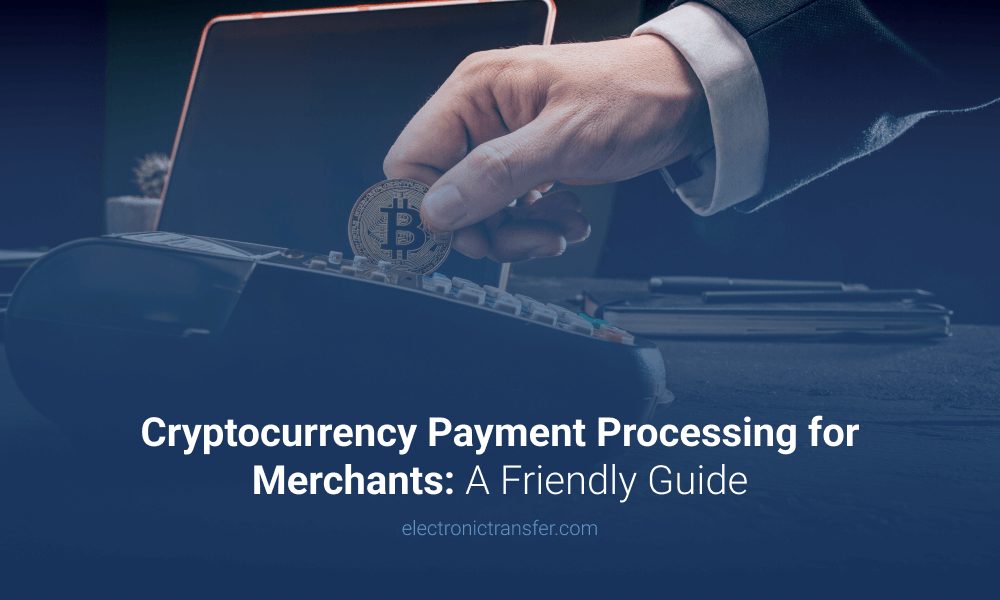Cryptocurrency Payment Processing for Merchants: A Friendly Guide

Is your business thinking about accepting cryptocurrency payments? That’s great! It’s a pretty cool idea as crypto is here to stay and comes with distinct benefits..
Let’s talk about what cryptocurrency payment processing for merchants means and how it could work for you..
What’s the Deal with Crypto Payments?
Wouldn’t it be great if you could accept payments from anywhere in the world, in a super fast, and secure way, and with lower fees than credit cards? That’s what crypto payments offer.
Cryptocurrencies are digital money that exist on computer networks called blockchains. Bitcoin is the most famous one, but there are others like Ethereum and Litecoin. When someone pays you in crypto, they’re essentially transferring some of this digital money to you.
How Does It Actually Work?
A crypto payment processor is the company that’ll help you handle crypto payments. When a customer wants to pay with crypto, they’ll send the payment from their digital wallet to yours, just like they would with any other currency. A payment processor helps make this happen smoothly, similar to how credit card processing works for regular money.
Here’s a quick rundown:
- Your customer chooses to pay with crypto at checkout.
- They receive a unique address to send the payment to.
- They use their crypto wallet to send the exact amount to this address.
- The payment processor confirms the transaction.
- You get the funds in your account, either as crypto or converted to regular money.
The whole process usually takes just a few minutes, which is way faster than traditional bank transfers.
Why Should You Care?
There are some pretty sweet perks to accepting crypto payments:
- You’ll pay less in fees: Credit card companies can charge a lot, sometimes 2-3% of each sale. Crypto fees are usually much lower, often less than 1%. That might not sound like much, but it can really add up!
- You get paid faster: Transactions usually clear within minutes or hours, not days.
- You can sell all over the world: Crypto doesn’t care about borders – you can easily accept payments from international customers without dealing with exchange rates or foreign transaction fees.
- Less chance of chargebacks: Once someone pays with crypto, it’s hard for them to take it back. This protects you from fraud and can be especially helpful if you’re operating in a high-risk business industry.
- It’s secure: The tech behind crypto (blockchain) is really hard to hack. Each transaction is recorded on thousands of computers, making it nearly impossible to fake or change.
More and more customers love it: Accepting this method of payment attracts tech-savvy customers and shows that your business is forward-thinking.

But What About the Downsides?
It’s not all sunshine and rainbows. There are some challenges to consider:
- Crypto prices can go up and down a lot: It can be a wild ride. This volatility means the value of your crypto earnings could change quickly.
- The rules around crypto can be confusing and they change a lot: Different countries have different regulations, and they’re still figuring out how to handle crypto. You’ll need to stay informed about the rules in your area.
- It might seem complicated at first: There’s some new stuff to learn, like how to use a crypto wallet and how to handle crypto transactions.
- You’ll need to explain how it works to your customers: Some customers might be new to crypto, therefore they may need guidance on how to use this payment method.
- You need to be extra careful about security: Digital money needs digital protection. You’ll need to learn some basic security practices to keep your crypto safe.
Picking a Cryptocurrency Payment Processor
When you’re ready to start, you’ll need to choose a company to help process your crypto payments. Here’s what to look for:
- Fees: Look for low transaction fees and no hidden costs.
- Supported cryptocurrencies: Make sure they accept the crypto you want to use.
- Security: Strong security measures are a must!
- Customer support: Check they have knowledgeable 24-hour support. Good help when you need it can be a lifesaver.
- Integration: Their software should work smoothly with your website or point-of-sale system.
- High-risk support: If you’re in a high-risk industry, make sure they’re okay with that.
The Most Popular Crypto Payment Processors
Take your time to compare and find the best fit for your business. There are quite a few options out there, so let’s break down some of the more popular ones:
- BitPay: They’ve been around for a while and really know their stuff. Here’s what you need to know. They:
- Are super user-friendly, so you won’t get lost in the tech jungle.
- Work with lots of different cryptocurrencies.
- Give you a credit card-like card to use with your crypto.
- Offer instant conversion to regular money if crypto’s price swings make you nervous.
- Help with invoicing, billing, and any other transaction.
- Charge a 1% fee for most crypto payments.
- Coinbase Commerce: If you’ve already dipped your toes into the world of crypto, you’ve probably heard of Coinbase. It’s great company especially if you’re just starting out because:
- It’s easy to set up.
- Works seamlessly if you’re already using other Coinbase services.
- Supports popular cryptocurrencies like Bitcoin, Ethereum, and more.
- Helps you create invoices and manage orders.
- Also charges a 1% fee for most transactions.
- CoinsPaid: This company is like the express lane of crypto payments. If you need to handle lots of transactions quickly, they’ve got you covered.
Here’s the scoop:- Great for businesses dealing with high volumes of payments.
- Supports a wide range of cryptocurrencies.
- Offers tools to help prevent fraud.
- Provides solid customer support if you get stuck.
- Charges a lower 0.5% fee for most cryptocurrencies.
- Coingate: They’re all about international businesses. Check it out:
- Supports over 100 different cryptocurrencies.
- Great for reaching customers in different countries.
- Helps settle payments in multiple currencies.
- Offers fraud prevention tools to keep things secure.
- Charges a 1% fee for most crypto transactions.
- CoinPayments: They do a bit of everything:
- Supports over 2250 coins.
- Can handle crypto, regular money, and even gift cards.
- Offers tools to prevent fraud and keep your money safe.
- Provides customer support if you need a helping hand.
- Charges a 1% fee for most crypto payments.
- BTCPay Server: This one’s for the DIY enthusiasts. It’s a self-hosted, open-source processor which means you can customize it as much as you like.
Here’s what you should know:- Gives you total control over your payment processing.
- Supports a good range of cryptocurrencies.
- Offers features like multi-currency settlement and fraud prevention.
- Great if you’re tech-savvy and like to customize everything.
- Charges a lower 0.5% fee for most cryptocurrencies.
- B2BinPay: They’re known for being super secure and reliable. Here’s the breakdown:
- Can handle a large number of transactions.
- Supports a wide range of cryptocurrencies.
- Offers tools for settling in multiple currencies and preventing fraud.
- Provides solid customer support if you need it.
- Charges a competitive 0.5% fee for most crypto transactions.
- Stripe: You might know Stripe for their various payment services, but they’ve joined the crypto party too. Here’s why you might like them:
- Seamless integration if you’re already using Stripe for other payments.
- Supports popular cryptocurrencies.
- Offers their usual array of features like fraud prevention and multi-currency settlement.
- Provides great customer support.
- Charges a 1% fee for most crypto transactions.
- PayPal: Even PayPal is getting in on the crypto game. It’s a familiar face in the payment world, and now it does crypto too. Here’s what you need to know:
- Convenient if your customers already use and trust PayPal.
- Supports major cryptocurrencies like Bitcoin and Ethereum.
- Offers standard features like fraud prevention and multi-currency support.
- Provides the customer support PayPal is known for.
- Charges a 1% fee for crypto transactions.
Setting It All Up
Getting started isn’t as hard as you might think:
- Choose carefully your payment processor.
- Integration: Add the correct plugin to your website, or use the company’s API if you’re tech-savvy. Many processors offer simple plugins for popular eCommerce platforms like Shopify or WooCommerce.
- Wallet setup: Set up a digital wallet to receive your payments. Your processor might provide one or you can use a separate wallet for added security.
Accounting: Figure out how to handle your taxes and bookkeeping. Some payment processors offer tools to help with this, or you might need to use separate accounting software.

Some Tips on How to Make It Work
- Manage price volatility: You can keep some of your payments in crypto or change it all to regular money right away. Many processors offer instant conversion to protect you from price swings.
- Stay compliant: Make sure you’re following all the rules in your area about crypto. This might include reporting your crypto income and paying appropriate taxes.
- Beef up security: Keep your digital money safe. Use strong passwords, enable two-factor authentication, and consider using a hardware wallet for large amounts.
- Educate your team: Teach your staff the basics of how crypto works. They should be able to answer simple questions from customers.
- Help your customers: Provide clear instructions on how to pay with crypto. You might want to create a simple guide or FAQ section on your website.
High Risk Businesses, Listen Up!
If you’re in a business that banks or credit card companies don’t like to work with much (like adult content, online gambling, or certain health products), crypto could be a game-changer for you. Here’s why:
- It’s harder for someone to shut down your payments: Traditional payment processors might close your account if they think your business is too risky, but crypto payments are more resistant to this.
- You might have fewer problems with chargebacks: This is a big deal if you’re in an industry with high chargeback rates.
Crypto isn’t a sure way to avoid the rules or regulations, but it can help you operate more smoothly within the guidelines.
Wrap Up
Accepting cryptocurrency payments might sound a bit scary at first, but it could open up some cool opportunities for your business. It’s fast, it’s global, and it’s where a lot of people think money is headed.
Start small, learn as you go, and see if it works for you. You could start by accepting crypto for just a portion of your sales, or try it out during a special promotion. Who knows? You might just be ahead of the curve.


